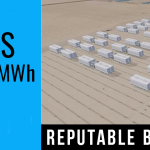
A materials science lab at Rice University has developed a relatively green lithium ion battery recycling process that allows for the retention and subsequent reuse of valuable component elements such as cobalt.
The method involves a so-called deep eutectic solvent—a compound that freezes at much lower temperatures than its constituent compounds—that can dissolve a variety of metal oxides, and the researchers reported that it had successfully extracted a substantial portion of the cobalt used in lithium batteries.
“It’s important to recover strategic metals like cobalt that are limited in supply and are critical for the performance of these energy-storage devices,” the head of the materials lab, Pulickel Ajayan, said. “Something to learn from our present situation with plastics is that it is the right time to have a comprehensive strategy for recycling the growing volume of battery waste.”
The strategic importance of cobalt in the battery industry has seen prices for the otherwise abundant metal soar over the last couple of years, but over the past six months it has slumped as stockpiles built up. The problem is, more than half the world’s supply of cobalt is in the Democratic Republic of Congo, where artisanal mining—a dangerous practice—and child labor add to an unstable political situation that make miners and investors nervous enough to fuel excessive price volatility.
The overall problem of battery recycling, however, is more serious, and it is likely to spur a lot more innovation in the recycling technology space. The number of electronic devices with lithium ion batteries is growing, and there are no signs that this growth will subside anytime soon in the gadget age. Then there are also more and more EVs on the roads, and these have a lot bigger batteries to be recycled or reused after their productive life ends.
Click Here to Read Full Article





